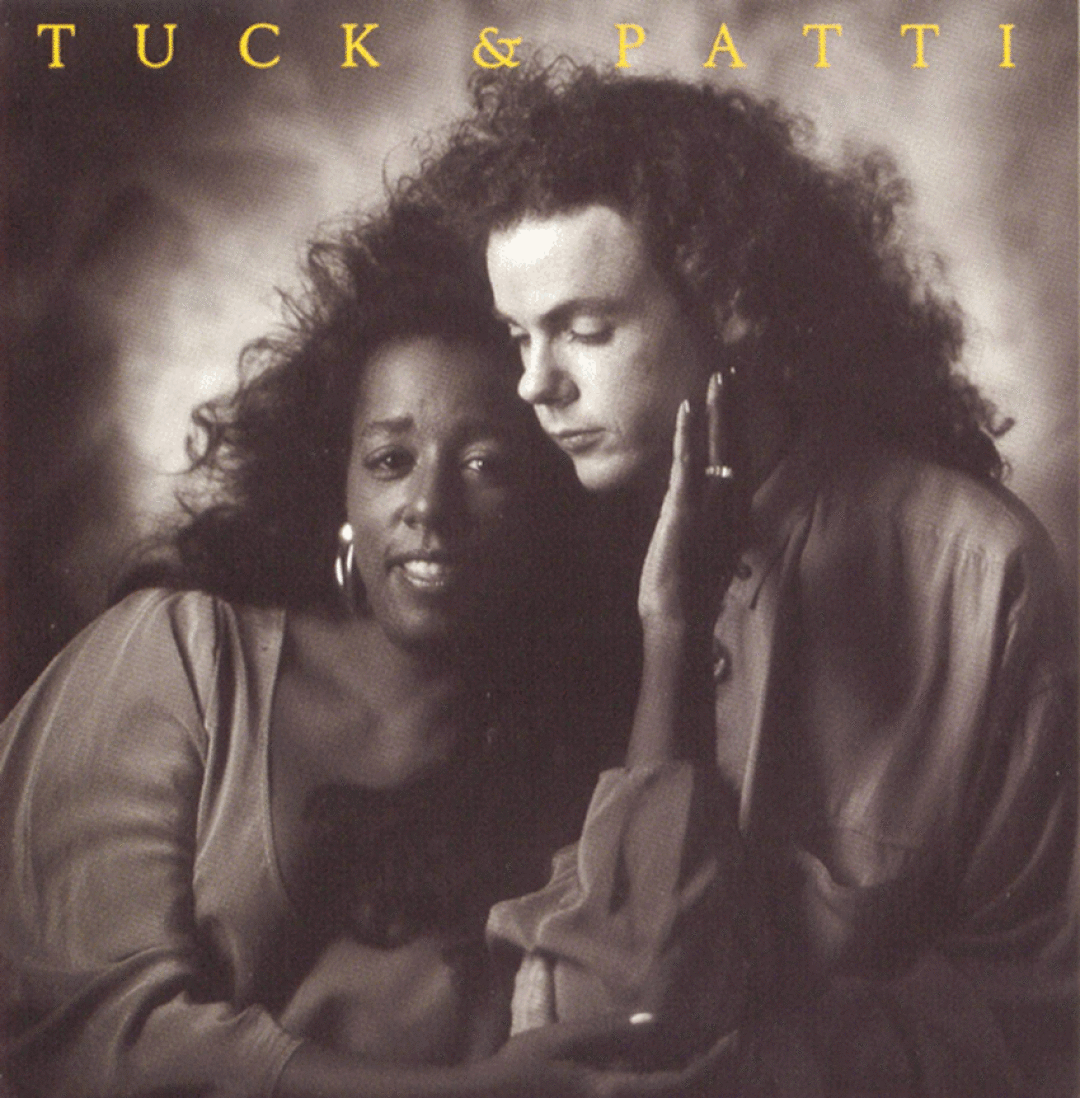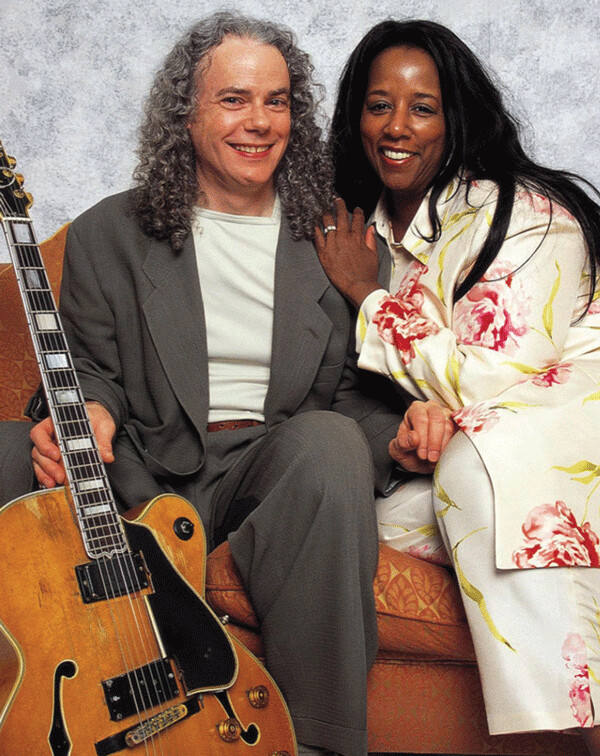Tuck & Patti and the mystery of turning keys

She sings, he plays guitar, and that’s it. No backup band, orchestration or anything else needed. That’s the entire formula for this world-famous jazzy duo. Tuck Andress and Patti Cathcart started performing together in 1978 and married in 1983. Their sound was so unique that they were offered recording contracts, but turned them down to perform live and hone their craft. They released their first album in 1988, bringing success that has endured ever since. They will perform for the first time in Duluth on Thursday, Dec. 5, 7:30 p.m. at the West Theater.
The Reader interviewed them by phone from their home in San Francisco.
What project are you working on now?
Tuck: We’ve fallen into being record producers and recording albums for people and mixing them. We’re working on a spoken word project for another client. So we use our studio for ourselves, which is what we always figured, and then somehow we ended up with this other role in our lives, which we enjoy, too.
Spoken word? It’s not William Shatner, is it?
Tuck: No, this one’s a meditation one, although his voice could work for that. Maybe.
Patti: It’s more like Mr. Spock.
Tuck was born in Tulsa, how did you get into music?
Tuck: Ed Sullivan and The Beatles, probably. Everyone in the world kind of got hit by rock and roll at the same time. I played classical piano for seven years before I started playing guitar. I was in garage bands and it was The Beatles and The Rolling Stones and you had to play guitar. There’s no piano in the garage. I picked up guitar and it got pretty serious pretty quickly. Anything I heard on the guitar that I didn’t know how to do, I tried to figure out how to do it.
Patti: I grew up in the San Francisco Bay area. There was always church, there was always music in our home. I played violin, sang in choirs and all that kind of thing. I always knew from the time when I was really little, about 5 or so, what I was going to do with my life. Music was it for me. I played in every kind of band you could think of, rock and folk and all sorts of stuff, in bars, top 40 bands, esoteric jazz, freestyle bands, you name it. But I always really liked smaller configurations. Full-on rock bands, jam rock bands, blues bands I enjoyed. But John Mayall did this record called “The Turning Point,” it was really a very sparse group, and I loved it so much. I thought wow, that’s really something nice to try. We started playing together groups that were smaller and smaller as well as doing my regular top 40 gigs and stuff. But that smaller, more intimate, more intimacy between the players, less people in the conversation, was more exquisite to me.
I read that you were in George Clinton’s circle at one point.
Patti: (Laughs) No, I went to all the concerts and did all that, but somehow, who knows, WIkipedia and that universe, I became a Bride of Funkenstein. This is not true, this never happened, I don’t know how it got into the whole thing. Like the one that we hate each other but we have to play together. Tuck played with The Gap Band and Leon Russell (both also from Tulsa) and Chaka Khan, so he was into funk.
Tuck: More than Patti was, actually. We were both in and out of, maybe, 300 bands before we met. Then the last 41 years, it’s just been the two of us. But most of those were more commercial bands playing funky music of one sort or another. The Gap Band was kind of the epitome of that, but that was also my training. I spent four years doing that. And it was through The Gap Band that I had experiences with Chaka Khan and Leon Russell, so we don’t overstate that one. But yeah, I played with The Gap Band for a long time, It happened at the same as going to Stanford (University). It was like in and out of Stanford and going to back to Tulsa to play with the Gap Band. Both were an education. It’d be difficult if I had to choose, but I might lean toward The Gap Band. You couldn’t beat that as an education.
So how did you two meet?
Patti: In a band in San Francisco in 1978. I went up to audition and Tuck was already in the band and I got the gig. Didn’t like the band, but I liked the guitar player. And he liked me, just musical part, not personal. Then the band fell apart of its own free will within a couple of months and we started being a duo.
How did you settle on the type of music you’re playing now?
Tuck: At least initially we were saying, “What song do you know? What song do you know?” We did songs that we liked, we didn’t really worry about the style because we both listened to and played all kinds of music. It didn’t really seem to make any difference what style we played, why restrict ourselves? We just did anything we wanted at the time. Our original song list had a whole category for Jimi Henrdix songs and one for Beatles songs and one for Steely Dan songs.
Patti: As opposed to being jazz, all that.
Tuck: Even initially we agreed that the lyrics should say something we agreed with. I don’t have to sing it but we both of us, you want to believe in the content of the lyrics. Then as Patti started writing songs, that became ever more a part of our sound, what she was saying with the lyrics.
Why did you turn down record offers?
Patti: We just said we’re not ready, we just got together. I had been in so many bands that got together and they’re going for a record deal and it’s always plotted toward that. We were having such a good time playing, we just said, let’s just play and get better at this. Because we were also being a duo, which like for Tuck, definitely, goes back to the drawing board as far as guitar style. He just felt like his regular pick playing, all that, just wouldn’t have the emotional breadth and depth of fingers. For me it’s like that feeling of, I’ve been singing in bands, horn bands, backup singers, the whole thing, even gospel choirs. All of a sudden you’re playing just with a guitar and a voice and really naked. While we loved it, we knew we weren’t as good as we should be.
Tuck: What record companies generally envisioned was, you guys are a great combination, let’s just fill it out with a rhythm section and then we’ll plot you into a jazz direction. You know, simple, logical, obvious. No one took the duo seriously. And why should they? Because we weren’t as good at it at the beginning. There weren’t any duos getting record deals.
It says on the cover of your first album, “no overdubbing, punching in or editing.”
Patti: That was the system we had to record. It was like, from the beginning to the end …
Tuck: Documentary.
Patti: If you made a mistake on the last note, it was like, aw man, gotta do it again. Tuck: The first several albums were that way and then we changed technology and then we could do the editing. We certainly proved our point, basically to ourselves. It is a little stressful recording that way. We feel like now we get better performances by being able to take the best of multiple takes rather than having to have one perfect take. It kind of breeds conservatism. If you’re in the middle of a great take and you’re getting closer and closer to the end, there’s really more and more incentive not to go try something you’ve never done before, in the moment. You just want to stay safe in that great take so you can salvage it. Once our cat meowed during the last chord of “My Romance” on the first album. We had to scrap the take.
How has the music industry changed?
Patti: Oh my goodness. We met in ‘78 and we didn’t put out our first record until ‘88, so we were playing for 10 years before we put out a record. The biggest thing for a journeyman, working, make-a-living-in-the-music-business musician, the biggest thing is having more than half your income disappear. The publishing royalties and all that stuff just literally disappear. Probably one of the most devastating parts of the change in business.
Tuck: Of course we were one of the fortunate groups that were selling enough records that we were making half our income from royalties. It’s a whole different world now. You build a Youtube presence, maybe, and then eventually you get into the record business.
Patti: It’s still the same thing, it’s still like being in the NBA. Not everybody gets in there, and then all the people that get in there don’t make the money that the stars you hear about make. It was wonderful that people could do it and not even be super super famous, but still make a living from doing their craft. It’s the same position with writers now and photographers and everybody. Everybody just takes it and uses it and no credit and you certainly aren’t getting paid for it.
Tuck: Anything involving copyright.
Patti: I think the way the music is made now, everybody complained about digital at first but now it’s great. Used well, it makes it sound better and clearer, all those kinds of things technically. So that solves that part of it. I see young people coming out all the time playing and I think, wow, they’ve done their homework and they have a history of music. I’m very inspired by Jacob Collier and I really like S.H.E. Our niece, Annie (Clark, a.k.a. St. Vincent), has done great things. I still hope with that, that there are people who are still in it for the creativity of the music, and the music is so important.
Did St. Vincent draw a lot of inspiration from you?
Tuck: She had an obvious life trajectory that we could see back when she was in her teens, so she didn’t need to be persuaded to do what she did. But we took her on the road early on and showed her the ropes and took her all over the world. First just as an extra person and then we turned her into a tour manager …
Patti: One summer ...
Tuck: … right after high school before she went to Berklee. So she it saw all from the inside. Obviously she soaked up things from us in terms of performance, even though we were pretty careful not to overly guide her in any way about that because we so trusted her inner gyroscope that’s been spinning very, very rapidly inside of her during her real clear path to explore. She doesn’t really need people to tell her what to do.
I read Tuck’s guitar playing described as “ambidextrous.” Is that literal?
Tuck: No. In fact, any time that I want to humble myself and remember what it’s like to be unable to play, ‘cause I take it for granted, and especially as a teacher: “Okay, I can do this stuff and you should be able to as well.” I just turn my guitar over and backward and man, it’s amazing what doesn’t cross over from one hand to the other. I was never that way. We’ve probably all met people who are ambidextrous. Seems like a really cool parlor trick. It’s been on my list along with learning out of place a lot of other instruments, just be able to turn it over and play something. Play one lick, well. I also read that you rely on the audience vibe to guide you when you do your live shows.
How does that work?
Patti: You can tell how people feel when you go out there. That’s kind of why I don’t make setlists. People write us and have requests and then we always some new tunes we’re doing. But you can make this setlist and then you go out and that’s the one you’re gonna do and it doesn’t really fit with what’s happened in the world that day. So I try to sort of have a feeling of how we all feel in that room that day, because when we all get in there, there’s an energy that happens. And then the music starts, it’s not just us standing there giving stuff. People receive it, so it’s a nice circular energy between the people who are listening and the people who are playing. I like to have that. I think that’s one of the addictive parts about playing live music. Contact.
Tuck: For me it’s equal parts baffling and impressive that Patti is able to do that in a more tangible way than I would. I fear that I’d be on the level of, what do they clap loudest about? And it turns out that’s pretty much beside the point. What’s really going to touch hearts, turn the key for somebody that you don’t even know, in the moment, it’s a complete mystery to me.
Patti: And me, too.
Tuck: I watch Patti do it night after night. You have to trust your intuition and your instincts.

